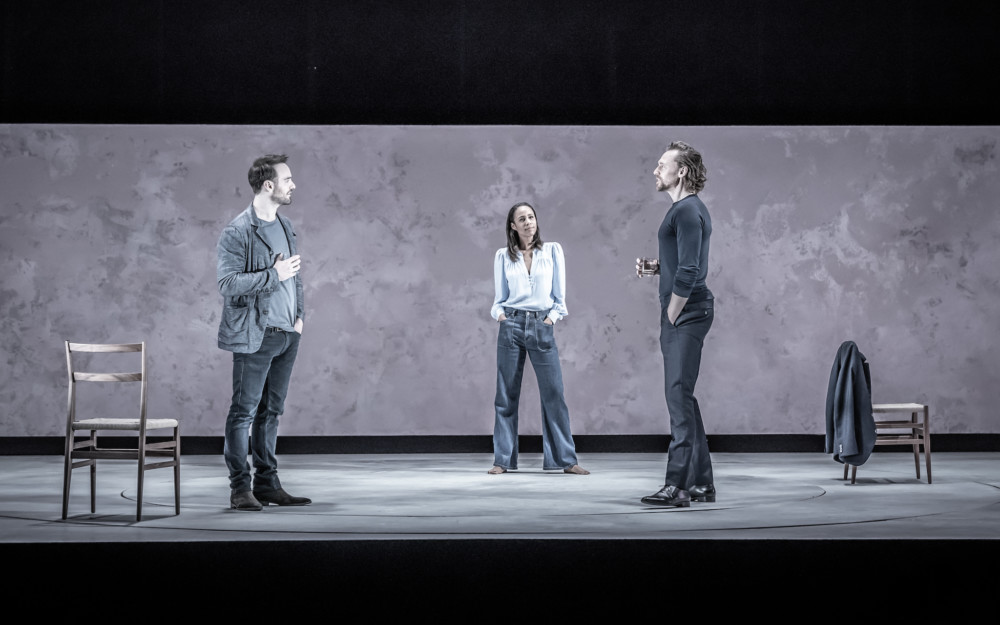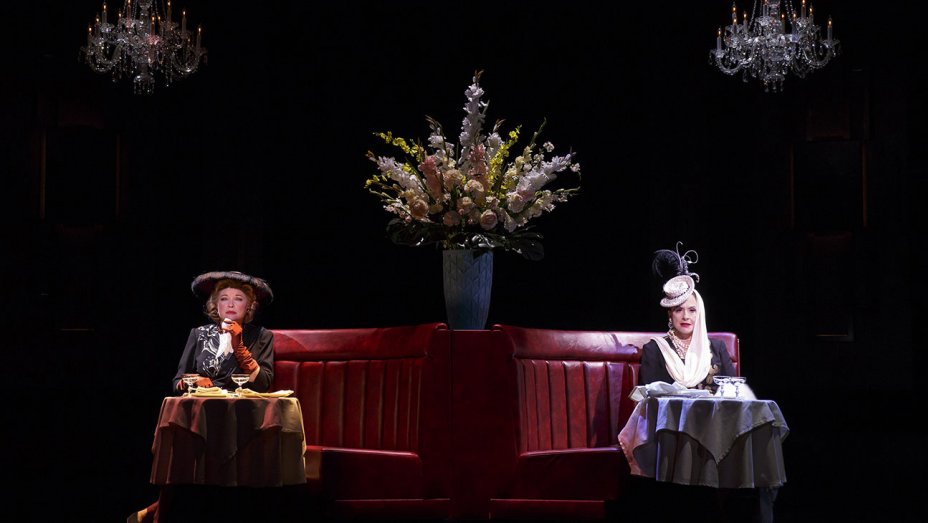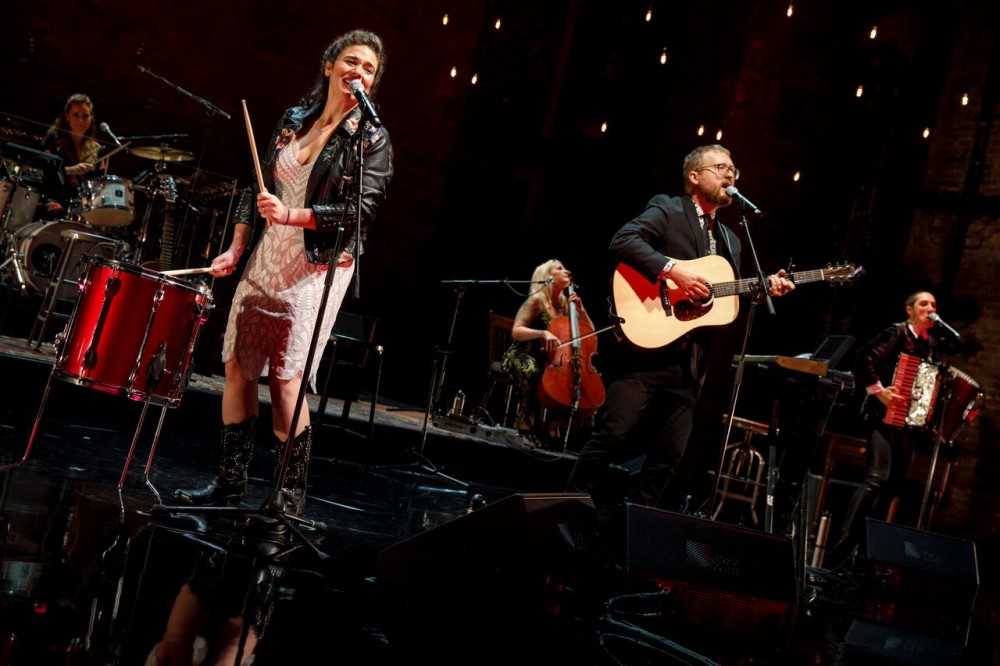
Charlie Cox, Zawe Ashton, Tom Hiddleston
By JK Clarke
Some experiences in life are only fully realized in hindsight. We don’t recognize a story is taking place until it is all over. Consequently, it often makes sense to start a story at the end, where it is finally understood in its entirety. This was likely the perspective of George S. Kaufman (and later Stephen Sondheim) in the 1934 play and 1981 musical, Merrily We Roll Along. It’s also the approach taken by Harold Pinter’s 1978 play, Betrayal, now in a gripping revival on Broadway at the Bernard B. Jacobs Theatre, directed with utter precision by Jamie Lloyd. A transfer of last year’s award winning West End production, this Betrayal is a quiet, balletic reflection by three players in an affair that started and ended over the course of seven years, somehow without going awry.
At the heart of Betrayal is the idea that an affair is not merely an infidelity, but rather an entirely new relationship that has started in the shadow of another. A relationship that requires the care and nurture of any other, but one that also maintains the risks (of heartbreak, of waning emotions) of any ordinary romantic arrangement between two people. The play opens with former illicit lovers Jerry (the always charming Charlie Cox – Downton Abbey, Boardwalk Empire) and Emma (played with a profound emotional complexity by Zawe Ashton) meeting in a pub in the spring of 1977, for the first time in the two years since their affair essentially just petered out. They seem to have tender feelings for one another, but Emma—a perfect candidate for polyamory who is living in the wrong era—has moved on to another affair despite maintaining her marriage . . . up until just this moment. Though she’d told her nonplussed husband Robert (a stoic and adroit Tom Hiddleston) about the affair many years before, she tells Jerry at this meeting that she’d just informed him the night before. Jerry is stunned and alarmed, as Robert is his best friend.
Later that day Jerry meets with Robert who informs him he’s known about the affair for years and, quite frankly, doesn’t seem to mind. He’s had his own affairs.


Tom Hiddleston, Zawe Ashton
From here the play jumps backward in time, in seven additional scenes that cover five different years, with the play finally ending in 1968, when inebriated Jerry first makes a pass at his friend’s wife, having just recently served as best man at their wedding. Regressively, we see the affair fade away, peak and begin. What we start to realize, as the play moves forward, is that at the heart of Betrayal is not a mere marital infidelity, but rather layer upon layer of broken trusts, promises and confidences. Yet, perhaps the greatest betrayal is that the story is being told to us, the audience. We almost feel like we’re looking in on an intimacy (that happens to follow very closely an affair that Pinter himself had with Joan Bakewell, a well-known BBC presenter and wife of BBC producer Michael Bakewell) to which we shouldn’t perhaps be privy.
While Betrayal thrives on Pinter’s extraordinary writing and minimalist storytelling, this production exceeds those boundaries. While the two male stars of the play are currently best known for playing action heroes plucked from the pages of comic books and more likely to be found at Comic Con than BroadwayCon; and that one is also known for dating a wildly famous, superficial pop star, it’s easy to get the feeling the production might end up being a bit . . . thin. But quite to the contrary, Cox and Hiddleston are magnificent, both mining expressiveness from seemingly tepid interplay between these stiff British intellectuals. Through their calm, there is an explosive intensity that couples perfectly with Ashton’s stunning performance as Emma, who seems to waver between strength and the verge of breakdown. She’s a woman who needs constant love and attention, and we empathize, forgiving her transgressions, as she’s clearly not getting enough of it from the men in her life.


Charlie Cox
But it’s probably Lloyd’s cool direction and Soutra Gilmour’s set decoration (including costumes) that sets the tone and makes the production great. Gilmour uses a sparse, set-less set, offering only a couple chairs, clean lines, and dark walls to convey the bleak, frank environment, augmented by Jon Clark’s calm, subtle—yet occasionally stark—lighting. Her use of extremely slow-moving turntables to move characters together or away from one another to convey movement of both space and time is literally breathtaking. The combination of these elements had a remarkable effect on the audience: they were stunningly quiet for a Broadway audience. No cell phone beeps, coughs, wrappers or whispers. The audience was rapt, hanging on every word, as if eavesdropping on a heartbreak. Hopefully, this will continue to be the case deeper into the run, because this is one big, emotional secret, and they’re not going to want to miss a word.
Betrayal. Through December 8 at the Bernard B. Jacobs Theatre (242 West 45th Street, between Seventh and Eighth Avenues). 90 minutes, no intermission. www.betrayalonbroadway.com
Photos: Marc Brenner






















